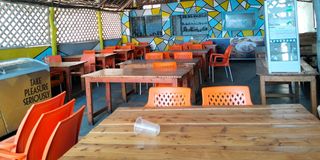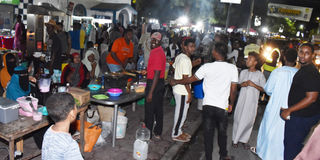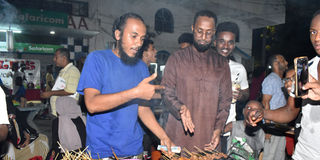Lamu island where all religions observe Ramadhan, Easter
It is Ramadhan season for Muslim believers globally but on Lamu island, it is Ramadhan for all.
Ramadhan, the ninth month of the Islamic calendar, is one of the most sacred periods for Muslims.
The Holy Month is designated as a time for prayer, fasting, introspection, and communal harmony.
This is also a time the Muslim faithful ought to let go of worldly pleasures and devote themselves to Allah (God).
Lamu Old Town, a Unesco World Heritage site, is mostly dominated by the Muslim community but is also cosmopolitan as one is likely to find all communities there.
Here, Muslims and non-Muslims have over the years adapted to the state of affairs –observing ‘general saumu’ (fasting) every time the
Holy Month of Ramadhan kicks in, completely abstaining from food, and sometimes other comforts, especially doing so in public.
While in the rest of the country other religions are busy going about their businesses, those living in Lamu Archipelago, particularly Lamu Old Town, must observe the fast and stick through it till later in the day when the Muslim brethren break the same.
During an interview with nation.africa, renowned Lamu Island Muslim cleric and elder Abdulkadir Mau explained that while other parts of Kenya have shops and restaurants operating normally during Ramadhan, the same businesses in Lamu Island always remain closed until later in the evenings when the fast has been broken.
Mr Mau, however, insists that the culture has since time immemorial been adopted by both Muslims and non-Muslims.
“I was born and raised here and I am 72. As per my observation since childhood, it’s impossible to find an open hotel or restaurant on the island between morning and evening, irrespective of which religion one aligns to. It’s a silent unwritten law that Ramadhan in the old town will be observed by all, a trend that has been happening for years now,” said Mr Mau.
Hamadi Mahmoud, an elder, noted that it is perceived as taboo for one to be spotted eating or chewing out on the streets of Lamu island during Ramadhan.
Mr Mahmoud says most of the time, such acts will be met with silent cold stares that will leave you uncomfortable in a fashion meant to remind you to behave even if you are not Muslim.

The closed Mangrove restaurant in Lamu Old Town as customers observe Ramadhan.
“All persons of the island observe Ramadhan either directly by fasting for those who are Islam or by closing down businesses and resisting the urge to eat in public by those who are not. It's seen as an act of respect and unity which aids those of us fasting in sticking to our routine,” said Mr Mahmoud.
Lamu Bush Gardens Seafront Hotel and Restaurant Proprietor Ghalib Alwy says both Muslims and Christians in Lamu Town have integrated well, a situation that has contributed to either of them respecting each religion's calendar of events, including Ramadhan, Eid-Ul-Fitr, Easter and Christmas.
Mr Alwy noted that an open eatery or restaurant can be the easiest temptation for those observing the fast (Ramadhan) which in human nature, can lead one to sin.
He revealed that the silent law of order applies to business premises owned by Muslims and non-Muslims, or those owned by Muslims but have been rented out to non-Muslims.

In Mombasa, streets become active in the evenings after breaking of fast with the aroma of spices and sizzling grills filling the air.
The upside, however, is that as a result of choosing to support Ramadhan, Muslim landlords, and house owners offer a rent waiver for the entire month of Ramadhan to all their tenants.
“This is more or less a precaution to ensure both sides emerge on the winning end at the end of it all. In fact, this is a time when those, not fasting save much of their cash, avoid promiscuity, and by the end of the day, lead straight lives throughout Ramadhan as they copy the Muslims observing the Holy Month. Christians and Muslims live in harmony in Lamu Town. We like it that way,” said Mr Alwy.
So widespread is the trend that even tourists and visitors coming into the old town do not expect any open restaurants or eateries during Ramadhan and there is never a fuss about this state of affairs.
A spot-check by nation.africa since the Holy Month of Ramadhan began last week shows that almost all the hotels, restaurants and other recreational facilities have remained shut.
Popular hotels including Mangrove Restaurant, Bush Gardens Seafront Hotel and Restaurant, Mwana Arafa Hotel, the Sunsail Hotel, Hapa Hapa Restaurant, Forodhani Café, and Furaha Leo Café are not operational.
These joints are always fully closed all day long, from 6am, only for them to be opened mostly at 6.30pm when the fasting is broken.
“We’re okay with such an arrangement. It’s not new to us. We know when you visit Lamu during Ramadhan, then you’re likely to fast as well. It’s Ramadhan for all here and we don’t complain,” said Godwin Thompson, a tourist.

The demand for local dishes is so high that they often sell out within minutes of opening their stalls in most evenings in Mombasa City.
In Mombasa, streets become active in the evenings with the aroma of spices and sizzling grills filling the air. Many entrepreneurs take advantage of this festive atmosphere by setting up food stalls in the bustling Makadara grounds.
Yahya Jeilan of Coko Snow restaurant says their shop located on Makadara Road is fully packed in the evening hours.
“Love and spirituality are more vibrant during the holy month and one main aspect that contributes to this is the street food and stalls that prepare fresh sweet and savoury meals for people to break their fasts with. Their presence brings out the joy and happiness of people while they enjoy their favourite foods and also support local youth and startups,” says Mr Jeilan.
Mr Abdullah Yasin of Its Juice Time says their restaurant specialises in Slush (a type of beverage made of flavoured ice) which is sold between Sh100 and Sh200.
"Ramadhan nights are special because of the snacks and drinks and a lot of people especially the youth have got an opportunity to sell at affordable prices and make a good profit out of it. Makadara area where lots of food stalls and snacks are set up during Ramadhan season, we also have a slush stall, it has a high market due to the high population there," Mr Yasin offers.
Many entrepreneurs in the port city take pride in serving meals that are not only delicious but also rooted in tradition.
The demand for their dishes is so high that they often sell out within minutes of opening their stalls. The competition is fierce, but the rewards are great, and many vendors make a significant amount of money during the month.





